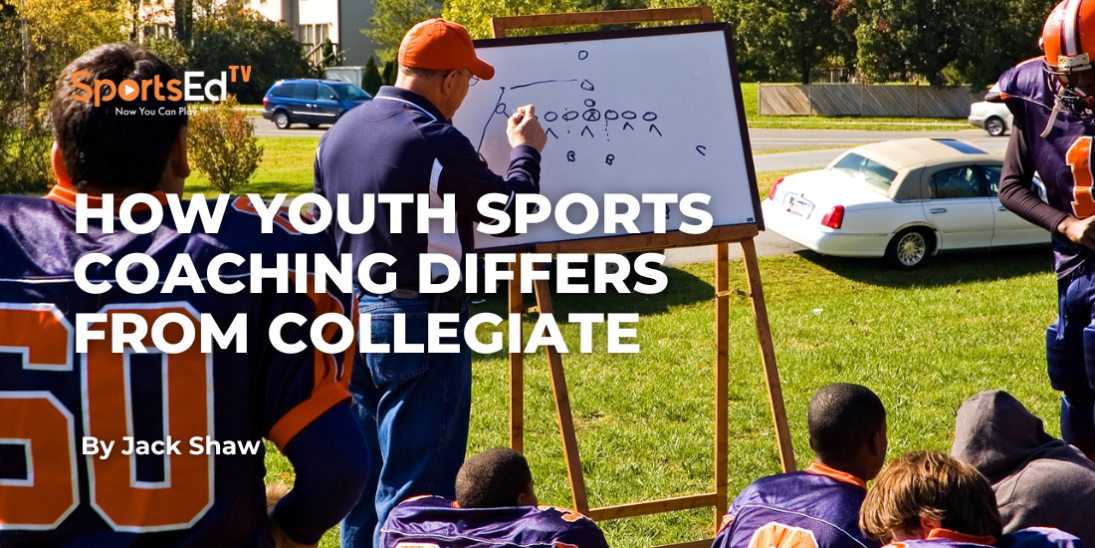Basketball, Football - American, Soccer, Sports Parenting, Volleyball
Welcome and thanks for visiting...

How Youth Sports Coaching Differs From Collegiate

From youth fields to college stadiums, sports remain fundamentally the same. Basketball, soccer and other sports still require your players to score and prevent scores. However, coaching team members on and off the field significantly differs. Here are the differences between coaching youth and collegiate athletes.
1. Experience Levels
Among the most significant differences is the experience levels. As a youth sports coach, you may have kids on your team playing the sport for the first time, while other athletes may have played for a few years. Coaches must balance their expertise and give each child equal focus in their development.
In contrast, college coaches have a roster of athletes with extensive experience. These young athletes have likely been playing since they were small children. While experts recommend starting at age 6, they may have begun earlier. With modern programs and resources, some kids start even younger.
2. Developmental Focus
Youth and collegiate sports focus on development, although in different ways. With school-age kids, coaches introduce the sport to a child to help them have fun. Imagine you have a youth baseball team with varying experience levels. In your first meetings, it’s essential to teach the responsibilities of each position and find which suits your athletes.
College sports focus on development but with a different approach. When coaching these student-athletes, you could be preparing them for professional leagues. Then, you must get them ready for tough competition. Other colleges are also spending time and resources, and their athletes are just as good as yours.
3. Practice Sessions
Athletes need practice, whether they are 10 or 20 years old. However, the frequency, length and drills in these sessions differ. College coaches have much longer days because of the different practice times. Your players have strength training, film sessions, scrimmages and other daily obligations. They also get time with the athletic training staff.
Coaching youth sports is different because there is generally less time with the athletes. These kids may come after school for an hour-long practice session to prepare for their games. Some coaches have two or three practices during the week before the next competition arrives. The intensity level is also lower than that of the collegiate level.
4. Pressure
Coaches want to win, regardless of where they are. However, the pressure to do so is different at every level. Collegiate coaches get paid millions of dollars to win games and championships, so their stakes are higher. Success or the lack thereof makes them the talking point of sports media, whether local or national. Mounting pressure could be a lot to handle.
The demand for wins and positive results still exists at the youth level, though the intensity is lower. While coaches want the best from their athletes, the most vital takeaways are learning and having fun. Kids have lives outside their sports, so coaches must make their time fulfilling. Experts say using positive affirmations helps kids reach their potential and mitigates stress.
5. Parental Participation
Moms and dads of athletes are involved with their children’s athletics, especially in their younger years. In youth sports, the parents become more involved with coaching and helping the team. One parent may help their kid’s soccer team with dribbling or goalie drills, while another brings snacks and beverages. Sometimes, it takes a village to coach a sports team.
Parental help nearly disappears at the collegiate level. Coaches don’t typically rely on their assistance unless there is a specific situation. For instance, players may require special accommodations and request their parents be present. Alternatively, their parent or guardian may be a former athlete who can assist the collegiate team.
6. Officiating
The relationship between coaches and officials can be precarious, though it’s vital for competitions. In youth sports, the referees are volunteers or people working part-time jobs with other careers to focus on. During your games, these officials are more lenient toward children. Youth coaches shouldn’t expect perfection, though they advise following the rules as much as possible.
In the collegiate ranks, there are higher expectations for officials. For example, referees in the NCAA Tournament can earn up to $2,000 per game due to the high stakes of each match. College coaches must be more aware of the officiating and the specific rules implemented. At this level, coaches can access replay reviews and other advanced technologies.
7. Travel
Travel is necessary for most sports and requires coordination among the coaching staff. At the younger level, coaches and their assistants generally don’t travel far. Youth leagues have a few teams in the city or country and stay within a particular region. Some exceptions apply to travel ball or other leagues where they cross state lines. Otherwise, they can stay close to home.
Collegiate coaches typically stick to a specific region, though they may travel far for tournaments or postseason games. These sporting events require long road trips or plane rides, depending on their resources. Regardless, there’s more travel than in youth sports. Coaches must also account for school schedules, considering the athletes are also in college courses.
8. Profession
When you’re a youth coach, your team might not be your primary occupation. Some team leaders are volunteers and don’t receive a dime for their services. Your day job could be in accounting or car sales before putting on your visor and whistle for evening practice. High school coaches must focus on academics throughout their day before coaching practice starts.
Conversely, college coaches focus only on leading their athletes. These professionals spend most of their days holding practice, speaking with players, and preparing for their next game. While they may own businesses and have other side hustles, college coaching is their priority. When the season ends, their primary focus is recruiting and getting kids to come to their school.
Distinguishing Youth and College Coaching
Coaching at any level requires critical traits such as leadership and determination. If you like the fine details, you may enjoy the daily life of these sports leaders. However, the difference between coaching at the youth and collegiate levels is significant. It all depends on what people prefer to focus on, but the end result for all ages should be happy, healthy, and talented athletes.








